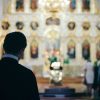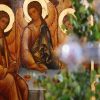God has provided many guides in the journey of life—parents, priests, teachers, saints, spouses, friends and others. One of the most important guides, very close and deep within us, is our conscience (syneidesis). In both Greek and Latin, this term derives from two words meaning “together” and “knowledge.” Conscience signifies self-knowledge, self-reflection, being conscious of one’s inner dialog of thoughts and feelings. As a distinct human faculty, it provides a sense of goodness or blameworthiness in our conduct and quality of character, urging us to do right and be good.
St. Dorotheos of Gaza devotes a valuable essay on conscience. He defines conscience as something of a “divine breath,” a “hot and bright spark,” which God placed in each person through creation. It is closely related to reason but something added to reason, a spiritual lamp that lights up the mind and shows the difference between right and wrong. To give a modern example, human reason has discovered and can manage nuclear power; but what to do with it and for what purpose, is a different thing, a matter of spiritual insight and moral goodness. Everyone possesses a moral conscience. But conscience can be trampled upon and buried under the weight of ignorance, wrong thinking, evil actions, and bad habits. That is tragically what had happened to humanity centuries upon centuries before Christ and continues to happen for those who do not fear God and do not heed God’s guidance.
What is God’s guidance? It is found in the Bible. The Bible provides the story of salvation. It tells how God called Abraham and others to form God’s people, it narrates the content of God’s law and commandments, it speaks the message and warnings of the prophets. Above all, according to St. Dorotheos, the Bible tells of Christ, His saving work, His teachings, His example of love, compassion, forgiveness, and healing. A chief aim of Christ is to liberate the conscience, to reveal it, raise it up, and bring it to life.
Why, St. Dorotheos asks, is the conscience called “adversary” in the scriptures? “Because it always opposes our evil desires and tells what we ought to do and we do not, or what we ought not to do and we do; and so it accuses us and is called our adversary.” God has given us the gift, but it remains to us to use it and make it grow in clarity and power. We have the capacity, and are accountable for it, either to bury it again or allow it to shine and illuminate the inner self and the course of our life. Muddy water cannot reflect our face. An inner self, marred by sin, cannot reflect clearly the lamp of the conscience but only dimply and darkly, as if a damaged mirror. Sometimes it seems that we do not perceive what the conscience tells us, as if we had hardly any conscience at all. But that is not the case at all, St. Dorotheos declares. “No one is without a conscience, since it is something divinely implanted in us, and it can never be destroyed.”
The great task in life is “to guard our conscience.” Guarding our conscience means that, so long as we live, we must be attentive and obedient to the promptings of its voice even in the smallest things. Never say, what is it if I say a few improper words? What does it matter if I eat something I should not? What difference if I stick my nose here and there? According to Dorotheos, there are no “little things” insofar as the conscience is concerned. The conscience is vitiated by small things, too, which then lead to more serious things, bad habits, and a hardened disposition that eats away like a malignant ulcer. St. Dorotheos counsels: “Let us give heed to trivial matters when they are trivial, lest they become grave. Doing what is right and what is wrong: both begin from small things and advance to what is great, either good or evil.”
The spiritual discipline of “guarding the conscience” has three horizons: looking towards God, towards neighbor, and towards material things. Regarding God, each person must take account of God’s precepts and obey his conscience in relation to God concerning even things not seen by others. To quote St. Dorotheos: “Did he neglect his prayer? If an evil thought came into his heart, was he vigilant and keep control of himself or did he entertain it? … Does he suspect his neighbor of evil and condemn him? To put it simply, all the hidden things that happen inside us, things which no one sees except God and our conscience, we need to take account of. This is what I mean by our conscience towards God.”
The second horizon of conscience is toward our neighbor. This means “not to do anything that we think may trouble or harm our neighbor in deed, or word, or gesture, or look.” Yes, truly, not only words and deeds, but also looks and gestures are capable of piercing the hearts of our neighbors, wounding them. To do such things, especially knowingly, not only harms the neighbor but also stains our conscience. By being always ready and alert not to harm or trouble our neighbor, but rather to love and help him, is the way to maintain a good conscience towards the neighbor.
As regards the third horizon of conscience, towards the world and material things, St. Dorotheos has in mind the proper and good use of things—“not to use things badly, not to render things useless, not to leave things about.” Here the saint becomes equally specific and also strikingly ecological. Pick up clothes, even of small value, and put them in their right place. Do not wash them unnecessarily and wear them out quickly. Make do with your mattress and do not ask for a larger one. Satisfy yourself with simple foods such as vegetables and olives, and do not indulge in more tasty and expensive foods—“all this is against conscience.”
St. Dorotheos follows us his essay on conscience with another on the fear of God, meaning deep respect and serious account of God. Watching over the conscience and heeding its voice, he seems to teach, heightens our awareness of God in his holy and awesome presence. For St. Dorotheos, there are two expressions of “fear of God, one preliminary, the other perfect.” The first is forming a desire for God out of fear of condemnation and torments, the starting point. This desire gradually leads to love of God for the sheer love of God itself, the love that casts out the first fear of God, according to scripture. Once the love and sweetness of God are known, another kind and very different fear is born: the fear not to lose God’s love and sweetness! This perfect fear arising out of love for God energizes a person to heed one’s conscience and to do God’s will in all things.
Regarding our relationship to God, St. Dorotheos cites St. Basil’s teaching about the three states of Christian life, defining metaphorically a slave, a hireling or mercenary, and a true son or daughter. The first does the will of God out of fear of punishment. The second does the same out of the desire to obtain a reward. And the third fulfills God’s will out love for God. These mark three stages of Christian growth. All these states are acceptable to God, our loving and merciful Father. The beginning is the first kind of fear of God that scripture calls the beginning of wisdom. However, the goal is to move toward the perfect love of God that we find in Jesus Christ from which, in the words of the Apostle Paul, no power on earth or in heaven can separate us.
Knowing what to do in order to grow in the spiritual stages is simple. The Prophet Isaiah declared: “Turn away from evil and do good.” But success in practicing these words can only happen through the careful heeding of the conscience and above all the help of God. The gate is narrow and the way hard. However, God’s grace upon finding receptive hearts works as the greatest power in the world. As a person heeds his conscience and relies on God’s grace, he begins “to take on a certain stability in the pursuit of what is good, then is in sight of rest, then steps forward towards peace, then knows from experience the struggle of war and the joy and happiness of peace … (and) so attains to the measure of a son. For so blessed are the peacemakers that they are called the very sons of God.”
St. Dorotheos offers many counsels how to walk the path of the two kinds of fear of God and of Christian perfection. Practice remembrance of death and accountability to God, take time for daily self-examination, find a spiritual guide, and avoid self-indulgence as the very fires of hell. Do not abuse your freedom or take liberties with one another, but rather show respect and honor toward others, being careful listeners, always heeding the voice of conscience. In trying to accomplish something, small or great, remember by all means not to lose your first priority, which is your own sense of sense of peace and communion with God. St. Paul taught: “Bear one another’s burden and so fulfill the law of Christ.” And St. Anthony used to say: “From our neighbor is life and from our neighbor is death.” So, therefore, serve one another with humility and mutual encouragement, seeking to benefit each other as well as yourselves with great love and the fear of God.

















